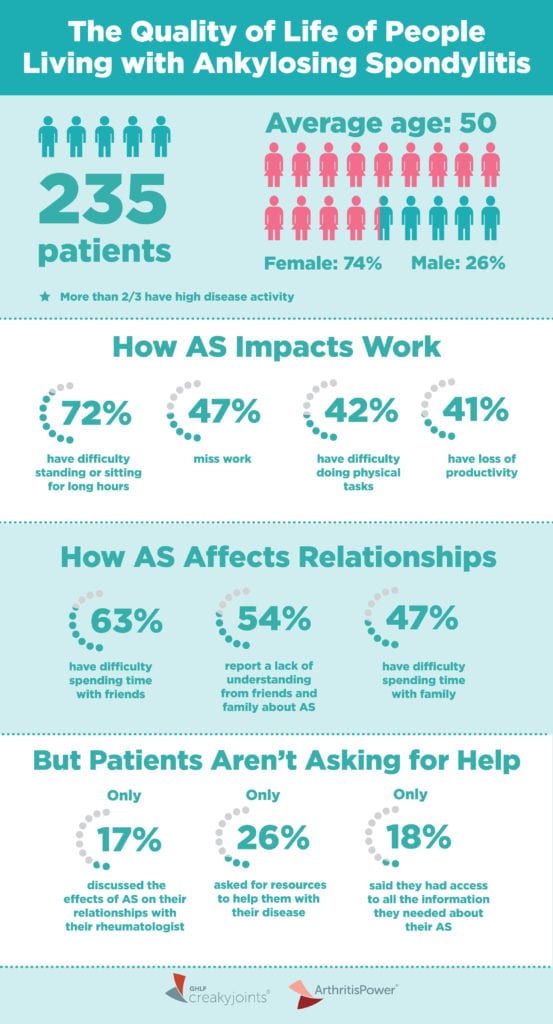When more than 75 percent of people with ankylosing spondylitis say they currently have back pain, stiffness, fatigue, and joint pain — not to mention a high prevalence of co-occurring health problems like depression, anxiety, and migraine — it’s not exactly surprising that it might have a big impact on a person’s work and personal life.
But few real-world studies have examined the impact of AS — a chronic, systemic, inflammatory disease that primarily affects the sacroiliac joints and spine — on health-related quality of life with regard to work and relationships.
Studying the quality of life of people with AS can be complex due to the slow progression and invisible nature of the disease.
In a recent study presented at the 2018 American College of Rheumatology/Association of Rheumatology Health Professionals (ACR/ARHP) Annual Meeting in Chicago, researchers, including those from our nonprofit organization the Global Healthy Living Foundation, surveyed 235 ankylosing spondylitis patients through our ArthritisPower research registry.
Of those, 74 percent were female, which is unique considering that AS is historically known as a more male-dominant condition. More than two-thirds of respondents reported high disease severity as assessed by the RAPID3. Overall, the study found that adults with ankylosing spondylitis experienced high unemployment and a significant impact on their personal relationships.
Here are more details on what we learned.


How Ankylosing Spondylitis Affects Personal Relationships
The most common impacts of AS on relationships were difficulty spending time with friends (63 percent), lack of understanding from friends and family about AS (54 percent), and difficulty spending time with family (47 percent).
In nearly all cases, women reported that AS took a greater toll on their relationships than men did. For example, while 45 percent of women said that AS caused difficulty maintaining friendships, only 25 percent of men did.
Some participants (8 percent of men and 6 percent of women) said that AS even resulted in separation or divorce.
How Ankylosing Spondylitis Affects Your Ability to Work
Half of respondents in the study reported being unemployed; the vast majority of those (91 percent) reported that this was due to AS.
Among the people who were still working, AS affected many aspects of their daily work lives.
People reported difficulty sitting or standing for long hours (72 percent), missing work (47 percent), difficulty doing physical tasks (42 percent), and loss of productivity (41 percent).
Here, too, in many cases, women reported that AS affected their ability to function well at work more than men. Twenty nine percent of women said they were frequently late to work compared with 12 percent of men, for example. And 24 percent of women said they even had to switch their job as a result of AS, while only 15 percent of men said the same.
Talking About Ankylosing Spondylitis with the Doctor
Despite the major ways AS seems to affect patients’ personal and work lives, very few people with AS in the study discussed with their rheumatologist the impact of the disease on their relationships (17 percent), or its effect on work or school (26 percent).
People were much more likely to talk to their doctor about their AS symptoms and how they’re changing over time, how they’re generally feeling, and side effects from treatment.
It makes sense that during a time-crunched doctor visit you’d be likelier to talk about those subjects than how AS is affecting, say, your marriage or career path, but it’s important to let your doctor know what’s happening in other areas of your life. It may be that you could benefit from seeing another specialist, like an occupational or physical therapist or a mental health professional.
Sharing more information with your rheumatologist about the impact of AS on your life using an app like ArthritisPower may be beneficial to you both. It can help your rheumatologist consider whether or how to adjust your treatment or flag when it may be appropriate to connect you with other health care providers.
Getting the Right Info to Manage AS
Another study finding was that people with AS feel they don’t have all the info they need to live well with their disease. Overall, 149 respondents (63 percent) reported that they did not have access to information on how to manage their fatigue. Only 42 respondents (18 percent) said that they had access to all the information they needed about their AS.
People also craved more information on how to manage symptoms on their own and how to find patient support or advocacy groups.
“This data shows us that AS has a huge impact on peoples’ daily quality of life, but AS patients don’t always discuss the burden with their doctors, friends, and families,” says study coauthor W. Benjamin Nowell, PhD, director of Patient-Centered Research at the Global Healthy Living Foundation.
Notably, 62 percent of people in the study reported having depression and 54 percent reported having anxiety. It can be difficult with a disease like AS, which often goes undiagnosed for so long, to feel like the people in your life can really understand what you’re going through and how the disease affects you.
“But it’s so important to share how you feel, both physically and emotionally, with your loved ones,” says Dr. Nowell. Your friends and family might assume no news is good news. They may have no idea what you’re going through unless you let them know.
“This research also highlights an increased need for discussions between patients and their rheumatologists regarding various impacts of AS,” says Dr. Nowell.
This study was done with support from Novartis Pharmaceuticals Corporation.





